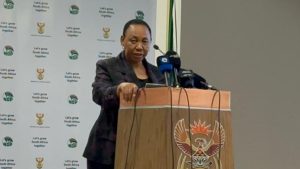Business Leadership South Africa (BLSA) has released a report on the negative economic impact of Greylisting on the country.
South Africa currently risks being Grey-listed next year in February if it fails to meet recommendations listed by the International Financial Action Task Force.
The report by Intelidex puts the probability of the country being Grey listed at 85%.
Greylisting would increase transaction costs for cross-border payments as well as the general reputation of the country. Business Leadership South Africa CEO Busi Mavuso says the country’s failures to prosecute commercial crimes means the country is likely to be Greylisted next year.
“The Financial Action Task Force is the leading global forum for the development and monitoring of International Standards Against Money Laundering and Terrorism Financing.”
“They actually do these assessments to look at how the country fairs in as far as the issues around money laundering are concerned in particular. So, South Africa has faced significant challenges in the investigation and prosecution of commercial crime particularly during and following the state capture era,” Mavuso adds.
Below is the full interview:
If South Africa is slow and unwilling to meet the standards of the FATF, the economic impact of Greylisting could have long-term economic damage to investment and business.
Financial firms around the world including banks will increase their due diligence to any South African client. This means there will be extensive processes for assessing the source of funds. As a result of the increased compliance, some firms may elect not to do business with any South African company or individual. It will reduce investment in the country.
Intellidex’s Stuart Theobald says South Africa will also lose its reputation as a country that enforces anti-money laundering rules and laws.
“South Africa no longer meets international standards for anti-money laundering and we should expect that global partners will lose confidence and Greylisting is a reflection of that confidence. Greylisting means institutions have to apply a higher risk category to South African counterparts, particularly, in the European Union and the United Kingdom. And when clients are categorised as high risk it means they are required to do due diligence on those clients. So South African corporations that have relations with offshore banks will face enhanced due diligence and more frequent questions on the source of funds.”
The BLSA report provides clear guidance on what the government should do to ensure Greylisting does not cause long-term damage to the economy.
“There is an 85% likelihood that we are actually going to be Grey listed as a country come February come 2023 and this report provides clear guidance as to what we as a country must do to make sure that Greylisting does not cause long-term damage to the economy, We all need to work together to ensure that commercial crime, investigation and prosecution as well as the anti-money laundering and terrorist financing supervision is world-class.”
Stuart adds, “South Africa needs to be clearly communicating to the world about its progress and the political will that it has invested into achieving compliance with FATF. We need leadership, we need to build capacity in our institutions to build the processes and systems. To demonstrate effectiveness we don’t only, can’t only bring cases to court we need to have successful prosecutions.”
Government has been submitting reports on steps it has taken to combat money laundering and terrorism financing. It will have to meet the FATF plenary in Feb 2023 to discuss recommendations and its action plans to comply with FATF regulations.
The SA Reserve Bank and Financial Services Conduct Authority have both implemented new supervision processes to comply. There have been joint programmes to improve the investigation of corruption between the NPA, DPCI, FIC, and SARS. Parliament is also working to create legislation to strengthen anti-laundering laws.






